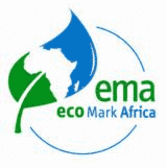African Eco-labelling Mechanism
Project description
Title: African Eco-labelling Mechanism
Commissioned by: German Federal Ministry for the Environment, Nature Conservation and Nuclear Safety (BMU)
Country: Kenya
Lead executing agency: African Regional Standardisation Organisation
Overall term: 2009 to 2013

Context
African economies are among those most severely affected by climate change phenomena, such as flooding and prolonged droughts. Mitigation of climate change and adapting to its impacts will be vital for the continent. Sustainable production methods are one way of adjusting, and key economic sectors in Africa, such as agriculture and forestry, offer potential for reducing greenhouse gas emissions. At the same time, for African products to succeed on world markets they will have to meet the growing demand among consumers for sustainably produced goods and services. So far, Africa has been missing out on these market opportunities.
Eco-labelling for African products would be an effective, market-based instrument for improving access to international markets. It would also encourage sustainable consumption and production patterns. The use of environmental labels to identify products and services that meet specific environmental and social standards will enable businesses to measure their performance, while also communicating the environmental credentials of their products. Knowing more of the background, consumers benefit by being able to make informed decisions. Governments can use eco-labels to encourage behavioural change among producers and consumers, leading to greater sustainability.
Objective
Trading opportunities have improved between African states, and also between Africa and the rest of the world. African economies are adapting to climate change and contributing to greenhouse gas mitigation.
Approach
GIZ is working with a large number of organisations to develop sustainability standards that can be certified and promoted using a single common label for African brands – the Eco-Mark Africa (EMA). The collaboration involves the African Regional Standardisation Organisation, the African Union Commission, the African Roundtable on Sustainable Consumption and Production, the United Nations Environmental Programme, the UN Industrial Development Organisation and the UN Economic Commission for Africa, as well as the various regional economic communities of Africa.
The African Eco-labelling Mechanism will function as a quality assurance system. Relevant standards are being defined to address ecological, social and climate concerns, and to ensure credible governance and implementation. Producers that meet these requirements, or the criteria of other standards systems recognised by the mechanism, will be entitled to use the EMA label.
The mechanism will be designed to accommodate the large number of smallholder producers and small businesses in Africa. A capacity building programme will prepare producers and service providers for the certification process, while a benchmarking and recognition process will help producers that have already been certified. By helping to reduce the cost of certification and marketing, the mechanism will encourage cooperation with other voluntary ecological and social standards organisations.
A single common label awarded on the basis of clear sustainability criteria will enhance the credibility and brand recognition of African products. The improved image will in turn raise their market potential and consumers will enjoy greater transparency.
The three-year development of the Eco-Mark Africa will entail the following main activities:
- Establishing the African Eco-labelling Mechanism as an organisational structure
- Developing a viable business model for financial self-sufficiency
- Developing comprehensive sustainability standards for assessing producers’ conformity with the mechanism criteria, and a recognition system to assimilate existing sustainability standards for agriculture, forestry, tourism and fisheries
- Capacity development to improve the policy environment for standards systems
- Convening a panel of marketing experts from private companies, NGOs and state agencies to promote the eco-label, both regionally and internationally
- Establishing links to national political bodies, regional associations and international agencies involved in promoting sustainable production.

Results achieved so far
The idea of the African eco-label was born in Africa, and the first steps have been taken here to put this vision into practice. A broad stakeholder consultation process has been started to develop the standards and to ensure the EMA responds to market demand.